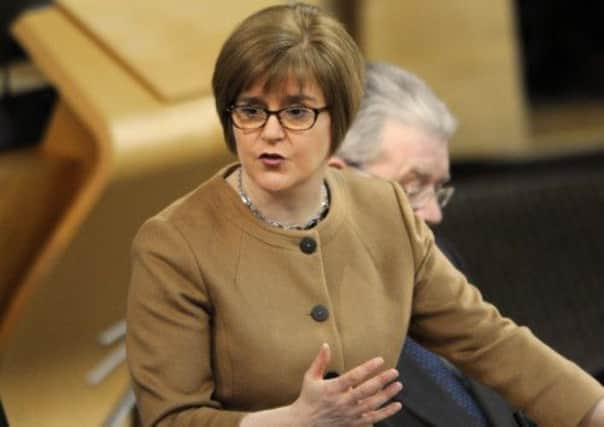Independence: Sturgeon rejects prisoner vote calls


The minister’s claim came as MSPs overwhelmingly backed the general principles of the Scottish Independence Referendum (Franchise) Bill, which set out who will be able to vote.
Ms Sturgeon described the bill which will give 16- and 17-year-olds the right to vote in next year’s ballot on independence as being “an essential part of the framework within which the referendum will be held”.
Advertisement
Hide AdAdvertisement
Hide AdHowever, the Deputy First Minister rejected a call from the Lib Dems to allow convicted prisoners serving short sentences to vote in the referendum on 18 September next year.
The franchise bill setting out who is eligible to vote is being introduced separately to the Scottish Independence Referendum Bill, which makes provision for a legal referendum.
Ms Sturgeon said ministers are “not persuaded” that convicted prisoners should be handed the vote, although she said they would “listen carefully” to the arguments.
“It is the position of the Scottish Government that convicted prisoners should not be entitled to vote in the referendum,” she said.
“The reason for that, in my view, is that if somebody commits a crime which lands them in prison, they break their contract with society. Therefore they lose some of the rights the rest of us take for granted. That, as the law stands just now, includes the right to vote in elections.”
Campaigners such as the Howard League for Penal Reform have said that inmates serving short sentences should be allowed to vote in the same way as remand prisoners are.
Lib Dem MSP Tavish Scott said the SNP opposed prisoner voting for political reasons and claimed the government had “bottled it in favour of the politically safe status quo”.
Mr Scott said: “Allowing prisoners on short-term sentences to vote would, as the Howard League for Penal Reform observe, send a powerful message that they remain part of wider Scotland with a stake in the nation’s future. To turn the government’s back on that argument sends precisely the opposite message.
Advertisement
Hide AdAdvertisement
Hide Ad“So is this for the Deputy First Minister and her government an issue of morality, the law or just politics? Based on the answer Nicola Sturgeon gave at the committee I am afraid that this is a political judgment.
“The principled argument, the progressive argument, the argument which will not find universal favour is discounted. Discounted I suspect, because the government have weighed up the political balance and want to be safe.
“That is their right. And with their majority no progressive change will take place to this Bill. But what this will mean is that not only me but many Scots will observe that when faced with a genuinely tough call about building a better Scotland, the nation’s politicians bottled it in favour of the politically safe status quo.”
The Lib Dems will force a vote on allowing prisoners to take part in the referendum, when the bill returns to parliament later this year.
Independent MSP Margo MacDonald said that the SNP government had taken an “absolutist, fundamentalist” position by denying prisoners a vote in next year’s independence referendum.
She said: “I can not see how the government can move from it, therefore I wonder why we bother debating it.”
Labour MSP Graeme Pearson, a former senior police officer, broke ranks with his party’s leadership as he called for an end to the “blanket ban” on convicted prisoners voting.
Mr Pearson said: “I believe that prisoners serving short sentences should be allowed to participate in all elections, with prisoners responsible for registering their vote.”
Advertisement
Hide AdAdvertisement
Hide AdTory MSP Annabel Goldie claimed that convicted prisoners had “sacrificed” their right to vote as she backed the government’s stance on the issue.
She said: “In my opinion, convicted prisoners serving custodial sentences have, by committing their crimes, sacrificed their entitlement to vote. The best way to preserve that entitlement is to stay out of prison.”
Ms Goldie went on to claim that the move to allow 16- and 17-year-olds to vote in the referendum was “premature”.